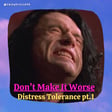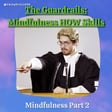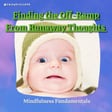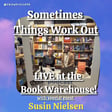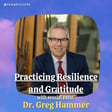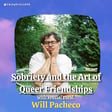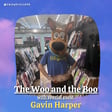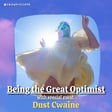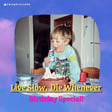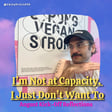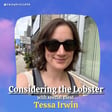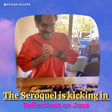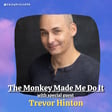Introduction and Guest Background
00:00:08
Speaker
Well hey there sweet peas! Welcome back to Friendless! I'm your host James Avromenko and this week I'm sitting down with the incredible Nicole Thompson. Nicole is a pleasure activist, a therapist, a relationship anarchy expert and we talk everything from breaking out of purity culture to building community, exploring polyamory, psychedelics, kink and how learning how to ask for what you want can change your whole goddamn life.
00:00:35
Speaker
It's an incredible interview. You're going to love it. So buckle up, lean back, get comfy, set your volume at a reasonable level, and enjoy my interview with Nicole Thompson here on Friendless.
Joy of Podcasting
00:00:48
Speaker
Nicole Thompson, how are you today? Hello, I am very excited to be here. Yes, very honored. Excellent. Well, thank you. I mean, hey, this is this is all you're doing and I really appreciate that. you know it's ah it's It's nice um sometimes when when the guest does the work for you.
00:01:05
Speaker
Absolutely. I love those. Absolutely. And now that I'm in your podcast, I get to just relax and you're going to hold the container. It is such a joy when I get to be a guest on a podcast. I'm like, cool, you're steering the boat. like Got this. Yes.
00:01:20
Speaker
Oh my God. That's actually one thing i really want guess more on other shows because I want exactly that feeling of like, I don't want the the responsibility. ah It's the ultimate sub, right? I get to sit back. Where are we going? You got this? Cool. cool yeah yeah ah but Yeah. i'll I'll give you my red lights when we need to, you know, right? You know, yeah. Sounds good.
Pleasure Activism and Personal Journey
00:01:44
Speaker
um So so um for listeners who may not be familiar with you, um I always like to start off interviews with a barr a very clear and simple question. Nicole, who the hell are you?
00:01:56
Speaker
Yes. I'm a human being. I think therapists forget that part often, right? So I'm a human being. I would say I'm a pleasure activist who is really passionate about liberating pleasure in our sex and relationships and There's a whole lifetime of work to be done in that space. I can say very confidently I'm only going to put a dent in it during my short lifetime on this. Truly, truly, I'm going to put one hell of a dent. And so the ways that I'm doing that are as a psychotherapist who has been trained in psychedelic assisted psychotherapy. And so I work with clients.
00:02:32
Speaker
all the way from, you know, the first initial trauma experiences all the way to reclaiming pleasure. I'm also a queer white relationship anarchist, and that is um a part of my polyamory and how I move about through the world. And so those are also really important identities.
00:02:49
Speaker
first generation student, ah parents are Mormon. We can get into that. So I come from purity culture and that's a big part of my liberation journey is getting out of purity culture and then getting into the field of psychology and really helping other people in that liberatory journey of reclaiming their pleasure.
Integrating Personal and Professional Life
00:03:08
Speaker
Yeah, I love that. I just I'm so fascinated by, you know, so I'm yeah, this is what's so exciting about talking to is that we could go in a million different directions. And I'm going to try my best to stay as direction as possible. But I admit there's gonna be a lot of spider webs here. It's all related. It's all related. Relationships are everywhere.
00:03:28
Speaker
Well, okay, that's actually, you know what, that I think is a really important thing to kind of start with is is recognizing, and this is something that my therapist constantly reminded me of, is that, you know, when you're working on your behavior in one direction, you know, you're you're focused on one thing, maybe it's how you show up at work, or how you show up in ah in an intimate relationship, or how you show up for yourself, whatever it might be.
00:03:49
Speaker
There's this instinct to only apply those skills to that area. And then everything else, you're just business as usual, right? Sure. you know And I think remembering that it's like, no, how you talk to yourself is how you end up talking to all humans.
00:04:04
Speaker
And so recognizing this sort of overlap, right? Yeah, absolutely. And I'm wondering, um yeah, okay, so with...
Breaking Away from Purity Culture
00:04:13
Speaker
I want to ask more about Mormonism. I'm going to just start with it because I'm fascinated by it. I wasn't raised in any kind of religion. yeah yeah yeah and And so um I'm i fascinated by, you know, obviously we don't have to get into the sort of intricacies of it. But but what I'm curious about with you is is how did you sort of spark that awakening from being within yeah this one culture and then sort of breaking through the cracks into this whole new world?
00:04:41
Speaker
Yes, absolutely. As someone who supports clients in doing this work, it is slow steps, slow little steps. This has been years in the making, which is why I'm passionate about helping people take less time. you know I'm like, it's okay. I've learned some of the secrets, the codes. Here you go. You know what I mean? and so yeah I would say that it was a very slow process of following my pleasure hoof and crying a lot along the way. right and so i would think I would say that the most important piece of that is finding community, finding people who embody more of the values that you want to move towards and then slowly taking steps towards that. I i always talk about how my sex education, if you even call it that, I wouldn't even call it that, I think that's important, and was abstinence only.
Challenges of Purity Culture
00:05:28
Speaker
And i got the paper test. Have you ever heard of that?
00:05:32
Speaker
No. Fun, fun. Yeah, so my sex education, right, is you walk into chapel because chapel is mandatory. I went to a Christian school my whole time, right? And so when I go there, they they bring up a blue piece of paper and a pink piece of paper, and they put blue on them. And they say that when you have sex, it's like coming together with these two pieces of paper. And then if you leave that person, oh and then the paper was ripped, yeah. And they were like, and who's going to want this piece of paper?
00:06:04
Speaker
Wow. Now, mind I have a purity ring, right? I still wear it now for like reclamation at this point. And there's stories to that. But um yeah, at the time I was like, absolutely.
00:06:15
Speaker
This is why I'm waiting until marriage. Absolutely. Right now, as a psychotherapist later, I'm like, that is extremely problematic. It is not trauma-informed minimum, right? And so that's really the beginning of my journey and stumbling through so many different lessons, relationships, experiences to really get to the space that I am now to like support other people with.
00:06:37
Speaker
not having so much pain through that process. Yeah. Yeah. Well, and especially when you think of, you know, oh God, you know what i one of the elements I, I, I find myself really worrying about and really just feeling a lot of sadness about is the idea of, you know, when, when that's your baseline of education, when that's your baseline of, of, of understanding, whatever that baseline might be, you know, in the context of this, but what, in whatever facet we're talking about,
00:07:05
Speaker
That's where you remain if you're not challenging those.
Confronting Ingrained Beliefs
00:07:08
Speaker
And so you are creating these sort of adult babies, you know, that are going through the world, only experiencing this very infantile, very very juvenile level of of of engagement and and missing out on so much, you know, and that feels really...
00:07:28
Speaker
Oh, God, there's so many words that could come into place there, but but that's just so disappointing. yeah know Absolutely. Absolutely. Yeah, I find it to be highly problematic. As a therapist, I'm always walking the edge between cultural humility of respecting a cultural practice. That's right.
00:07:46
Speaker
And also who ah Dr. Rachel Smith, who was one of my professors when during my training, she also runs these um purity culture recovery groups and has done a lot of research in it because her dad was a pastor. And so she even got it way more. she we have an episode on my podcast, Modern Anarchy, where she talks about not even knowing that women can masturbate until she was in college and like having no context. Right. And so a lot of her research and work there has found stuff on how like, yeah, ah people who experience purity culture show similar symptoms of people who have experienced childhood sexual assault. They lack understanding of their bodies and in consent and,
00:08:26
Speaker
Yeah, even in my own journey after going through a sexual assault, there was this ah very normalized thing that I've heard now within people who haveve experienced purity culture of after you have that sort of experience, if you know it wasn't a stranger and most experiences aren't, this sort of sense of, oh, I need to work it out with this person because I've already had sex with this one person, so now I need to stay.
00:08:47
Speaker
Oof. Right? And so i think... Yeah, that's what completely propelled me to go into the field of psychology. And now like sitting in that space of like, what does it mean to be culturally, you know, humble and respectful of a specific culture, but also call out some of these highly problematic lack of education and so man, I'm dance like dancing that line all the time as a therapist.
00:09:10
Speaker
Yeah, yeah. Well, and you know it's it's a really brave stance and it's really tough stance because ah what i've what I've found ah in my experience is when you start challenging these beliefs, the first reaction is often anger from these people, right? Is the rejection because they're, you know,
00:09:26
Speaker
they When you're told something is fundamentally true, and then later on, that's pushed against, you're now not only pushing against the idea, but you're pushing against who that person is.
00:09:37
Speaker
Right? And that's terrifying, right? yeah um ah and And I'm curious, how are you how do you go about sort of like... advocating those kinds of conversations or even getting into those kind of conversations, you know, like, do you end up, do you find yourself kind of sitting down, find yourself in places where you're actually pushing up against, you know, elders in the, you know, or, or, or some kind of, you know, leadership role or anything like that?
Therapeutic Approaches and Conversations
00:10:02
Speaker
Or is it more about just in sessions?
00:10:05
Speaker
Sir, I think it depends on the container I'm in, right? Because, Right now, I'm finishing up my last year of my doctorate. So I'm doing community mental health in Indiana, which is a very unique demographic of folks, right? And so they're not coming to me to try and challenge purity culture. They might be in it and enjoying it for their own journey, right? And so I'm not even talking about that. And then I have my own clients who specifically come to me say,
00:10:32
Speaker
often they're like, hey, I'm Mormon and I got out of it too. Can you help me? I'm like, yes, I can definitely help you. And so then I'm definitely talking about it. yeah And then when I was in school and the classes, oh gosh, I was definitely talking about it then because at that point I'm like, I am going into hundreds of thousands of dollars of debt because I'm a first gen student. i don't have parents who can pay for that.
00:10:52
Speaker
And if I'm going to pay for this class, I'm going to fucking push back. like Are you kidding me? And so the amount of crap I got about psychedelics, about polyamory, you can only imagine. And so I push back all the time because I'm like, I'm paying for this course. Absolutely not. And so I would say it depends on the container and what the intention is of the space, you know. Sure, sure. yeah Yeah. Thank you for that context, because that's a really that's a really great reminder, too, is the idea of like how you approach every room has to be within its own context, right? Absolutely. I was just having a conversation with somebody the other day about this idea of so much of my frustration around a lot of the sort of, you know,
00:11:34
Speaker
online conversations around these things, which I already kind of tend to avoid as is you know just you know For your mental health. yeah yeah exactly Right, exactly. you know um you know If I can't see the person's face, I probably am going to at most engage with maybe one comment and then we're done.
00:11:52
Speaker
Right, exactly, same. and Right, but then but then um and you know it it comes up mostly in those kinds of environments, but but you know elsewhere as well is this is just these sort of these really really complex issues these really complex topics that get kind of boiled down into slogans you know and and just lack any nuance and any kind of understanding of of uh permutations or or how it could play out differently or you know and and and i find this has been one of the things that i've been really frustrated with lately um
00:12:26
Speaker
is is the the inadvertent kind of sloganizing of of very radical ideas and very radical pushback that now is getting distilled down.
00:12:37
Speaker
um And I'm curious yeah about your experience within within these kinds of conversations. How are you um sort of, forging your own path through this and how are you sort of holding your own truth without getting kind of swept away but the by the tide and the and the sort of the mass ah mass agreements or things like that?
Advocating for Change and Community
00:12:57
Speaker
Yeah. Usually I'm just like, Hey, you can do what you want to do. I'll just talk about my own life. You know what I mean? You know what I mean? I'm not here to tell you what to do, but Lord knows I'll start sharing about my own experience and what I've done.
00:13:09
Speaker
I'm not here to say where you're supposed to go, but I'll tell you exactly what I did. And if that triggers you, maybe that's something to reflect for yourself. Do you know what I mean? If that inspires you, great. I'm not even talking about where you should go. Right. Because, um,
00:13:25
Speaker
It's frustrating. I've had like guests on the podcast and I think this is part of just a bit of mononormative culture and an experience where like we will start to talk about expansive relating and polyamory and then like there's this almost immediate st um next sentence of there's nothing wrong with monogamy and it's like no one said that.
00:13:43
Speaker
yeah I support all forms. Like where, could you imagine if a queer person was like, hey, I'm queer and there's nothing wrong with with heterosexuals. It's like, whoa, we didn't say that. But it's like almost like defense that we have to do. And so for myself, I've just realized like, okay, I'm just going to talk about myself. Like, hey, you guys do whatever you want.
00:14:01
Speaker
I'm over here. burn me at the stake it's fine i'm having a good time you know yeah yeah sort of you know use use the time you get as long as you get it right yeah yeah yeah yeah so when it comes down you know i'd like to uh start shifting into these questions or around sort of polyamory and and and and and and building relationships building connections um yeah it's something that i am uh you know i'm not gonna i'm obviously not gonna overshare many personal details.
Overcoming Shame and Expressing Desires
00:14:32
Speaker
This is a public you know platform, ah but but but it's something I'm navigating with a partner of mine where we're um where coming back to the system that Jessica Fern developed around the hearts, right? you know hearts and and And kind of fleshing out what each of those steps mean mean for us and our connection. Beautiful. and ah Yeah, it's really fun. I'm really grateful for it. you know Yeah. um
00:14:57
Speaker
and and um one of the One of the things that I wanted to kind of get your perspective on is, um well, there's many things, but the the first is the idea of shame and, and you know, something that you've you've touched on already.
00:15:12
Speaker
And I know something you touch on a lot in your work in general is this idea of expressing your own desires and sort of recognizing your power within that dynamic. um and And I'm curious to start us there, right?
00:15:28
Speaker
where do you Where would you recommend kind of go going about even just identifying those signs of insecurity or of of shame within yourself?
00:15:40
Speaker
I think when we get quiet. and really tune in to our internal experience, we we have longings, we have desires, and we will silence them. i think if we slow down enough, we'll we'll have that moment where like, oh I want to say this, but I don't know, and then we pull it back.
00:15:59
Speaker
Start to notice those things. Feminist psychology would call that the relational paradox, these moments where we fear if we are our authentic self that it might threaten a disconnection in the relationship.
00:16:11
Speaker
And evolutionarily, that is one of the scariest things to happen is to lose connection. And so we are battling this experience. But if you deny your authentic self,
00:16:23
Speaker
to stay in connection with a person, you actually lose your connection with yourself, right? And so then for me, I would start to notice this feeling of like, not physical dizziness, but like emotional dizziness, where I would just be like ruminating on these different things and ruminating and ruminating and ruminating because there are aspects of my life that I was not expressing or that I was sitting in fear with. And so you start to feel that when you feel really down and sad and all these other pieces because there are parts of your desire and longing that we're not in connection with, even on a big scale, right? Because think of something like the Sunday Scaries.
00:17:01
Speaker
Yeah. Capitalism is not made for all of us. It is made for the people at the top. Okay. So when you're feeling that, God, oh my God, ah look that is a reflection of a desire we all have for a quite different radical world that it is hard to imagine in our current structures. Right. And so I think on that big scale, even to the smaller scale, right, of our most close interpersonal relationships, we have that. And so polyamory was definitely one of those things, especially around sexuality, right?
00:17:30
Speaker
Many of us don't even have the language around sexuality. I think about it like the emotion wheel with therapy, you know how you start with those big emotions, get out to the more finer ones. Most people, myself included in the past, I was starting to explore in the kink community, this beautiful, curious lover asked me a very simple and easy question.
00:17:49
Speaker
how do you like to be touched? And I had no response. No, that's, that's, I would, that's when I get up and leave, you know? Okay. yeah So we need a wheel. We need a wheel here. like, I like this kind of pressure in this area. And I like this and I like this sort of variation, this sort of speed, right? Like we have to form the language for that. And the biggest thing that I've learned in my career with psychotherapy is that our relationships form our sense of self.
00:18:17
Speaker
And so community is so transformative. And so when you want to get out of shame, you have to change your community. When you are in rural Idaho, like one of my clients, and you're struggling to find anybody, that often means finding online communities, other sorts of meetups and stuff until you can find those people in person.
00:18:36
Speaker
um But it 100% necessary to find the people with similar values to let down that shame. You cannot do it by yourself. Yeah. Yeah. That's, I love that reminder because that is something that I am constantly, you know, i was about to say trying to find a balance, but my therapist would say it's not about balance. So forget that, you know, but right. you know But just, but just, you know, navigating the, the in between of, of what work do I want to continue to do with myself and what work can I not do by myself?
00:19:08
Speaker
right you know um um And sort of navigating who to bring in who to ask, how to ask it. right Those are all questions that I'm continually practicing. um and And so the other side of this idea of shame is sort of stepping into, a you know, the word you use is is is your power, right?
Building Confidence and Community Support
00:19:25
Speaker
You know, and I really like that. I like that kind of the idea of just that, you know, literally the empowerment of it, right? It's it's clear. um And, and,
00:19:33
Speaker
and ah what are some steps you can recommend? You know, I know these are sort of generic, they they it's hard to be super, super specific, but, but what are some things someone could try, you know, they've, so they've identified their, their sort of baseline and things that they want to work with.
00:19:50
Speaker
um Maybe they want to ask about some desires. What are some things they could practice to, to sort of build that confidence to actually speak out and, and communicate that?
00:20:02
Speaker
Well, yeah, thinking about the community, again, finding those people and then also finding receptive people. It is 100% essential that um when you are with a lover and you say, i don't want this sort of touch tonight, that they say, thank you for telling me and not, why won't you do this? Please, I really want. is so much harder to be empowered when you have a partner or person who is doing that to you. And so you need to find the wider community, as well as the people close to you that will support your nose and your yeses equally. Right.
00:20:33
Speaker
And then beyond that, also for talking about internal work, I think there's a lot to do with even something like journaling. I'm really big into narrative therapy because and existential thought. But I think narrative therapy is a bit more digested like digestible to think about than existentialism, which is a whole big thing. But meaning making, right? That's the big thing I like about existential therapy is meaning making. We're always making meaning of our experience and we're always creating stories and narrative.
00:21:02
Speaker
And so the more we can slow down and be conscious to realize, oh, I'm telling myself that I'm the person who is anxious at a party. Mm-hmm. hey, you know what? I've grown up to be that person. I'm the first person to pet the animal and the first person to go to like a coloring table and be like, cool, I'm over here.
00:21:22
Speaker
You know what? And also we can absolutely do challenging things. Could you imagine if I, you know, my fear of public speaking prevented me from ever starting a podcast? I would just be like, can't, sorry, it's not who I am.
00:21:35
Speaker
No, I had to work through that and start to write a new narrative of who I am. We were talking about our podcast and how we evolve and change, right? so your narrative, of who you are and what the show is has changed. The same thing with every aspect of our lives. And so you have to start to write new narratives that I am the person who is going to express my desires.
00:21:54
Speaker
I am the person who is going to tell people how I'm feeling and what I want. And so that's like the beginning of the work paired with finding good community. And then it just kind of keeps growing. I think it's important to remember that it's a practice and it's a muscle, right? You don't just lift 300 pounds the first day It's going to take slow building of that and then it gets stronger and stronger and stronger. And I think this is why particularly so interested in sexuality because it's so repressed in our culture. We all have a relationship to sexuality. Even if you're asexual, there's still a relationship to sexuality there. And so no matter who you are, you have that relationship. And given that it's so repressed in our society, the more that you can learn to flex the muscle of actually communicating what you want and don't want, that translates into every area of your life. Once you've conquered that mountain, it's like, okay, what's next? You know, like it just so, it's just really passionate about supporting people in that space specifically.
00:22:50
Speaker
Yeah. Oh, i love that. Also, you're spot on. You just vocalized an experience I had when it's like, you know, if if if I can be brave enough to ask somebody to paddle me, I can yeah pretty much, you know, I could ask my boss for something, you know, right? Exactly. Exactly. And so that's transformative for folks. Yeah. Yeah.
00:23:08
Speaker
Oh, it's beautiful. Yeah. And um a lot of the work that I did in feminist psychotherapy would also even talk about the voice. i thought I found that really fascinating just to think about how, you know, as a feminist, if we look back to the earlier years of women in media, right, I would be like, hi, my name is Nicole and I'm a woman.
00:23:27
Speaker
I'm really happy to be here in this podcast right now versus, hey, i orgasm. I feel pleasure in my body and I cum hard, right? Like that is a very different breath and embodiment. And so I think that that's also a really big part of this too, is the embodiment factor of it all.
00:23:45
Speaker
Yeah. It is a, I mean, that that that first voice feels so disembodied. it Like literally, it feels it feels like it's not coming out of a body, right? yeah it's It's somewhere else, you know?
00:24:03
Speaker
one of the sort of temporal questions of the show is this idea of what even community is, right?
Community, Intimacy, and Accountability
00:24:11
Speaker
Because it can it can mean anything, right? It can mean so many things to so many people. And um i always love kind of opening this section with the, you know, another one of those, like, it's an easy question to ask, but you can take it any direction you want.
00:24:25
Speaker
To you, what does community mean? Are you ready? How nerdy are we going to get? That's the question. i mean You know, the best part is we're on a podcast. So like, jackson and kids can do it yeah, exactly. Yeah, yeah, yeah. I love that you asked this question because I was telling you I was just celebrating the four year anniversary for my podcast, Modern Anarchy. And I started my show from a post-it note, right? i was like, I it's, it's on my wall here. i'm I'm looking at it. uncensored interviews with people who are pushing the boundaries of societal thinking. It's changed a lot since then, right?
00:25:00
Speaker
But I started from this one post-it note. And so I got one of those big ah post-it note boards, you know, that the bigger ones that you can stick up up and on a wall and stuff. And so I'm um looking at that right now. And so for my party last month, I asked, what does community mean to you?
00:25:15
Speaker
And so i had all my friends and community write it out. And so I was going to read some of their words because I feel like that would be beautiful. communalize Exactly. Exactly. they're all in different handwriting and I feel like it's really beautiful.
00:25:29
Speaker
um It's probably my favorite form of art in the, in my house right now. Right. It's priceless. ah So the words that they wrote were mutuality, care, security, reliability,
00:25:43
Speaker
shared values, reciprocal trust, compassion, ritual, and accountability. Ooh.
00:25:55
Speaker
I was like, I got cool friends in my life. yeah yeah yeah You got a good circle there. Yeah, I do. I like what I love so much about that list is that it, you know, this circles back to something that I encounter often when asking this question is that it can go in so many directions and it can encompass so many things.
00:26:13
Speaker
And yet there's this underlying, ah ah acknowledgement of the intimacy behind it, the need for intimacy, right? And and it almost translate translates into what does intimacy mean to that person, right? um Whether they even recognize it or not, right?
00:26:28
Speaker
um You know, the things like ritual, right? um I think we don't recognize how many things we do are actually rituals, um you know, because we just do them regularly and and they've kind of lost that sacred edge, you know. um um but That's like ah something I'm sort of curious about from your perspective is is is sort of How do you find yourself, or or do you find yourself, kind of making ritual out of some of the more kind of mundane or or repetitive things that you do, whether with yourself or with with your community?
00:27:05
Speaker
Yeah, absolutely. I rock climb every Sunday. So that's my time where I meet my friends and they come together. right And so that's such an important space for me that I go to. Even if I um i have rheumatoid arthritis, there's some days I really can't climb at all.
00:27:22
Speaker
And I'm like, well, I'm still going to go for community. I go to talk to people. I go to see other people. And again, relationships form our quality of life and our sense of self. And so these are the people that see me and are a part of who I am. And so I ask about their life, they ask about mine.
00:27:38
Speaker
And that's such an important ritual. I think you're your question of of community is important because I, as a queer person, right, I'm a part of the queer community. But when I think about that broadly, I don't really have a, like, there's no sense of accountability for that word. You know what I mean? Like that, that sense of community is so broad there are how many of us I don't even know at this point or even the polyamorous community or the kink community the psychedelic community the therapist community those are communities I'm a part of but there's not this sense of accountability and so it's interesting as you get smaller and smaller like what it means to actually live in community where there's accountability because that's a whole different thing someone but doesn't call you out but calls you in to expand more on something
00:28:24
Speaker
Yeah, that, you know, that's, that is something that I have been wrestling with, and with this idea of what I've been kind of, I've been toying with it. I haven't quite got, you know, the terms that I'm sure someone much wiser than me has already landed on this somewhere. But, you know, I've been, I've been thinking of it as sort of like compassionate, radical exclusion.
Selective Community Building
00:28:43
Speaker
And it's this idea of like, for me personally, you know, it's, it's, it's not that I'm like, you're a bad person, and I don't want you around. It's that, the people who I need in my tight circle are the people who have, you know, done certain things with themselves, you know, have certain perspectives, have certain understandings, have curiosities, whatever it might be.
00:29:02
Speaker
That's not to say they all agree with me, but there we're all headed in a similar direction, right? um And so, you know, one of the things for me personally, when I'm sort of, you know, rebuilding my my my networks and things like that is not necessarily like,
00:29:18
Speaker
swinging the doors open and say, everybody come on in. Right. You know, it's it's being a lot more meticulous and a lot more selective of who comes in, um which which builds a smaller community, but I find a stronger one.
00:29:30
Speaker
Right. yeah um and it And it comes back to what you just said about the idea of accountability. And that's something I think I'd like to hear. yeah I'd love to hear a little bit more on from you about. um First of all, sort of from your perspective, what does accountability even mean?
00:29:45
Speaker
and And then how do you how do you incorporate that into your sort of how you show up within your community and how do you want others to incorporate it? Great question.
00:29:56
Speaker
Yeah, i think it's important to remember that we're all, again, like i said, human beings. And so rupture and repair in relationships is inevitable, right? There will be mistakes. I make mistakes. We all make mistakes. And so accountability is coming back for that repair moment and to care.
00:30:15
Speaker
responsibility i almost said accountability so i'll switch out a word right responsibility that's a word that feels very close to me for our actions and how we impact people and the ways that we move through the world i i often don't even say i'm polyamorous because i'm more of a really it's like yes and if i'm speaking to a wider audience so i don't know where your audience is so i say like oh i'm polyamorous In my space, I would say like, oh, I'm a relationship anarchist because I don't even use really that frame. And so I try to bring that level of intentionality to all of my relationships. That's how I see relationship anarchy to be. ah
00:30:49
Speaker
I did my dissertation on relationship anarchy and published the first research study on it. And I think the biggest frame would be that we all have multiple relationships. Mm hmm. most of us do not have sex with more than one person, but all of us have multiple relationships. And so that frame shift is radically different. So yeah, what does it mean to be accountable in all of these different relationships that I have different orbits with?
00:31:14
Speaker
Oh gosh. I mean, that is a question that I am fundamentally studying for the rest of my life. I think it's also really fascinating. i went into hundreds of thousands of dollars of debt to get my doctorate in clinical psychology. I now have this level of privileged awareness of education on psychology and humanness that my mom who never went to college doesn't have, that my none of my family has, that many of the people that I don't work with have.
00:31:39
Speaker
These are people that are in my community as my clients and or in my community in my city of Chicago or and or in my community as in on this earth that is suffering under climate change, right? like So like we're all in this together.
00:31:52
Speaker
yeah So like, what does it mean to be accountable to that? Oh, I have no idea how to change that system, right? Because at some point when I start excluding people, um I always believe that people who are who have not done the work are hurting inside. Yes.
00:32:10
Speaker
yeah And have been hurt by the systems. And so it's like, how do I draw that line to be like, you're not in my circle because you've been hurt by the systems and you're not doing the work, but you but you are hurting me.
00:32:22
Speaker
And so at some point I do need to have space. Exactly. And also what is restorative justice look like? How do we keep everybody like, I don't know.
00:32:33
Speaker
i just make free warrior resources like a podcast. you know I'm like, it's free. Come listen. i have no idea. I'm trying my best. You know what it will and that's you know And I think you're scratching at something too is the idea of you know what exactly even is accountability and what is responsibility.
Complexity of Accountability and Trauma
00:32:50
Speaker
And and there's these questions. Often i come back to this thought of you you can't, like, accountability is actually an internal behavior. It's not external.
00:33:00
Speaker
um You know, even things like, you know, the justice system, which is, you know, fundamentally broken, but, but oh you know, or whatever it might be, like, that isn't holding someone accountable. That's just punishing someone retroactively or or what retrospectively, whatever the correct word for us, I hear But, you know, accountability is, like,
00:33:20
Speaker
a recognition of, oh, I behaved like this and I would like to change that in the future. So I'm going acknowledge it. Right. You know, ah at least that's how I kind of take it. Right. Well, and then we get into complex things like epigenetics and I'm a, I'm a, I'm a preface this with but just some big caution because I don't,
00:33:39
Speaker
We don't know and I don't want to create narratives that important. The placebo effect is important. So it's important to kind of like caution around this, but some of the studies with ah rats and mice, I'm gonna go mice.
00:33:53
Speaker
Okay, one of them, one of the rodents, got it. ah They did this study with cherry blossoms, right? Where they did some classical conditioning where they would have the stimulus of the cherry blossom and then shock them, give them some sort of pain negative stimulus.
00:34:07
Speaker
And so they did that for the first generation. They didn't do it for the subsequent generations. And up to three generations later, those mice still showed the same reaction of fear to a cherry blossom smell.
00:34:19
Speaker
So now you can ask really deep questions of like, who is responsible for my stuff? Is it three generations back? Who's responsible then for them, right? And then all of these bigger systems. Yeah, I know.
00:34:31
Speaker
That is a deeply complex situation. And then again, the self is formed in relationship. there There is no individual self. And so when we're saying like I need to take accountability for myself, it's like I'm going to do that through relationships.
00:34:45
Speaker
Obviously, there's an internal dialogue, but that internal dialogue is shaped by your relationship. it's just – yeah who Yep. You know, like, whoa. Oh, yeah. Oh, yeah. I mean, i loved all of that. i we need we need We need like 30 more minutes of you just like running, you know? Running, yeah.
00:35:01
Speaker
Absolutely. Absolutely. That's what I'm trying to do, figuring it out, you know? Yeah. Yeah. But I really appreciate the the acceptance that it's like it's not a simple answer. It's not just ah one sentence. Well, what you do is this, you know, it's it's it it's staggeringly complex.
00:35:19
Speaker
And it's something that people will spend their entire lives reconciling with and still not getting to answer because there kind of isn't one. Right. yeah um you know as As you said, you just kind of you're human, you just do your best, right? And you see what happens, so right?
00:35:33
Speaker
um And then you stand on the shoulders of giants, right? like Even the the language that we're speaking right now was created by humans who took you know who took over the land that I live on, right? and so like All of that is there. And so like I am standing on their giant, their shoulders. And I would hope that during my short lived experience that I'm creating more space for future generations to be able to run at rates that I don't even comprehend. They are going to fly up a mountain that I have struggled to earn my muscles for. And I'm so excited for them. And so I think that, yeah, hopefully we're just using our time to,
00:36:09
Speaker
further the the betterment of future society, including animals, not just our humanness, which we are animals, but like the whole planet, right? So this is all important. ah Community, I'm in community with the pigeons that come and take the bird seed out of my bird feeder over here, right? So it's all important.
00:36:28
Speaker
And so hopefully just trying to do our best, but I think it's really overwhelming when you, or not, I think it's an incredibly overwhelming when we live in such a modern age where you can just see access to any level of human atrocity that is happening right now. And what I frequently see with myself and my community, both clients and my friends is ah a level of a trauma response, right? It's like seeing this and going through the four different ones of freeze, fight, fawn.
00:36:55
Speaker
Fight. No, freeze. Fight, flight, freeze, fawn. Yes. Right. Right. am i Freeze, flight, fight, fawn. I got it. go I got it. I got a doctorate. I'm cool. It's somewhere in there. You know what I mean?
00:37:11
Speaker
But truly. And so that's like often what I see. Right. And and then in that deeper question of like, how do we live in all of this privilege when there's so much going on in the world? And like, again, so what does it mean to be in community on a global scale? It's These are really deep questions that we're all sitting with right now. And I ah really hope for a revolution in the future because we certainly have enough resources on this planet to for the whole world. And so we need some sort of change on a global scale when 49% of the global wealth is owned by the 1%.
00:37:38
Speaker
That's not an American problem. that's a That's a global problem. That's exactly right. yeah I mean, and you know i mean you know something that I've been chewing on, you know at the time that we're recording this, the Met Gala just happened yeah yesterday. And and you know I'm not somebody who, like i don't I don't follow that stuff, but you know photos were were popping up. And it it just you know every year it comes around, and I just think...
00:38:00
Speaker
what the fuck is this? Like, what the fuck is happening? what What is this? What is this bizarre, you know, ritual that is happening in the middle of, you know, as I gesture your wildly at, you know, everything else that's happening in the world, right? And and how how are we, my curiosity is really like, how are people attending that reconciling, attending an event like that while the world is as it is, you know? Let's interview them. Let's talk.
00:38:32
Speaker
Right? Let's hear where their consciousness is at. Zendaya, my lines are open, you know? Yeah, exactly. Yeah, hit us up. ah Yeah. Yeah, absolutely. And I think that the reality is that there's so many of us that want change. We want change. We want change. We want change. And also, least in America, if you don't want to go bankrupt because you had to go to the ah ER from an emergency situation, how to take an ambulance,
00:38:56
Speaker
then you better show up for your nine to five job if you're lucky nine to five, right? um You better show up for that damn job. And then, you know, you're pretty exhausted at the end of the day and you've got limited time and energy. And so there are so many ways where the system keeps us all in this continually and continually. And so it's,
00:39:12
Speaker
It's a really difficult space where so much of us want change. And then also you you got to show up for your 40 hours of work. You know, if you're lucky again under the system that that's all you work.
Psychedelic Therapy in Community
00:39:23
Speaker
It's so that that does circle me back into because I I wanted to get us into the the the kilk realm and the psych the psychedelic realm soon.
00:39:35
Speaker
But I don't like I don't want like hard pivot into it. So I want to try and find a way to to to get there between what we're talking about. I can do it if you want me to. But it's this idea of, you know, we're talking about community and a lot of, you know, what I find in reflection, you know, when I listen back to episodes, when I listen back to just how I sort of instinctively communicate, it often ends up coming across, not always, but when I think, I think when I'm speaking sort of, you know, yeah, as I say, sort of instinctively, it comes across a little bit like, you know,
00:40:11
Speaker
a one-to-one or sort of like an individualistic you know uh transaction almost um and and i'm more curious on working towards sort of um removing that transactional element and instead the sort of like what can a community actually do ah that individuals can't. And it's it's not that everyone in that community does the same thing. It's that they they hold up different pieces, right?
00:40:38
Speaker
um And I'm curious, ah yeah, to sort of start getting towards where I want to go. But before that, sort of, how would you recommend, you know, because you've talked a lot about finding people and finding communities. and And I'm almost thinking the next stage is sort of like,
00:40:58
Speaker
who do you bring in or how do you sort of like, for lack better word, assess people, you know, or or or or how do you recognize the needs you you have for that community that you're building?
00:41:11
Speaker
I think it's an interesting question to pose to therapists who charged money for that, right? ah Yeah. and And deservedly so. I'll say that. I mean, i I'm alive because of my therapist. So, like, i will i'll I'll pay his mortgage anytime I can, you know? Right.
00:41:27
Speaker
And also, right, so then that goes back to that other question of, like, we shouldn't have education be so privileged for that you have to take out hundreds of thousands of dollars like myself. Because that drastically changed my community and what I want to bring closer because then as people who don't have certain skills that I've been taught, I realized that there's ways where then that relationship starts to drain in certain ways. And so then I determine it based on that. but like What does it mean at the end of the day that when I look at someone who has a certain amount of skills and go, well, you are actually someone who should be my therapy client and pay me money to come to.
00:42:06
Speaker
Sure. Now, again, i have student loans, so I got to get out of this. And I do. and And so like capitalism isn't going anywhere. And under this system, I got to charge money. Here we are. I've got sliding scale fees. This is what we do. Right.
00:42:16
Speaker
Yeah. But like, ultimately, that's the question you're asking is like, how do we determine who's in our community versus not? And at scales of like when a relationship is no longer mutually empowering. Right. um and and And so I do try to think about the ways that even if someone doesn't have the same skills, the same values, like there's that faint light it's not a famous saying, but like that quote that like everyone is your teacher.
00:42:40
Speaker
Yes. Yeah. hmm. What can I learn from this person who has just as much of a complex existential existence up there as I do? And they've lived things that I have never walked. And so like, what can I learn from that person? Right. So trying to expand that out, but we're also finite beings. And so you do have to take that space.
00:42:59
Speaker
When you are being harmed. And so I hope you can hear me answering this question with a non answer because I too am very bothered by the fact that I went into the school to get to this level and now have this awareness and going, wow, this system's real fucked up.
00:43:14
Speaker
And I wish that my mom had more education. I wish that my family had more, like, like I just, I wish all people had more. And so
00:43:24
Speaker
yeah I don't have the answers. This is why I make free educational content. But to pivot into psychedelics, right? So you you were talking about wanting to go there. The place that I trained at is Sana Healing Collective in Chicago. And they're saying is community is medicine. and so part of a huge piece of my training is that psychedelics are not a silver bullet in any capacity at all, actually.
00:43:51
Speaker
Psychedelics often are, we talk about them as nonspecific amplifiers. And so it's going to bring up whatever needs to be brought up in that state. And that could be pain, trauma, fear. Some of the most people have extremely difficult times on psychedelics. And Back in the 70s, there was this big, you know, like, oh, we've got to put it in the water. yeah yeah It's going to liberate all the people. And so what we see now is that when you take a psychedelic and in your circles, all hedge fund folks, they say, great, how do we capitalize on this and mass produce so that we can make thousands, hundreds of thousands of millions of dollars?
00:44:27
Speaker
Yep. and that is a very different circle than a circle that takes a psychedelic and goes wow this has indigenous roots there are in indigenous communities that use this medicine we need to make sure we don't take it so much that they don't have access to it how do we give back those are two different circles same drug yeah and so then it comes back to that discussion of community that we kind of started with here is like who's in your circle the self is formed in relationship Wow.
00:44:52
Speaker
I mean, it's you, you're, you're, you're vocalizing things I've observed, you know, like I've observed the way, you know, I never went to Coachella, but I, but i'm you know, right. But, but, but I've been aware of it for, you know, 20 years, you know, and I've seen how it's changed and how Burning Man has changed and I've seen year on year. And then.
00:45:10
Speaker
seeing now you know hedge fund but people you know being at it at the front of burning man and i'm like what is happening what is this now you know and and and yeah and then they and then they they you know they blast themselves on whatever and then they go home but after the weekend and decide how to yeah they go right back to how do i profit off of this and It's obscene. It feels, I mean, if to me, it feels obscene, you know, but, um, um, the psychedelic realm is something that I'm endlessly fascinated by for, for, for a few different directions in
Therapeutic vs. Recreational Psychedelics
00:45:44
Speaker
that, you know, ah so me personally, I'm, uh, uh,
00:45:48
Speaker
Again, without going into crazy detail, I'm sober for, you know, four reasons. um And I definitely had my my my time in the past of abusing, ah you know, amongst them psychedelics.
00:46:03
Speaker
Sure. And always feeling... a little bit of guilt around that. ah Because I've all, you know, like i since I first was exposed to them, I always recognized the the sacred element and the the the sort of, you know, to come back to the ritual element of it, right? Yeah. and um And so I've been sober almost two years now. and And I have been sort of internally kicking the tires of psychedelic therapy.
00:46:31
Speaker
um and and And so when you when you came up, I was like, oh my God, not that I'm like, I get free therapy, but more just like, I won't. Let's talk him about it. you know I just want to hear it because I've known people who have done it and had ah incredible experiences.
00:46:47
Speaker
um But I'm curious about, let let's let's start at the beginning. Just for the baseline, just for listeners, you know what exactly is psychedelic therapy? And then let's kind of build out from there.
00:46:59
Speaker
Yeah, absolutely. So oof there is lots of different ways that this is done for sure. So i can talk about like how I do it with the practice that I'm attached to. And there's lots of different ways. There are people who do it more in a biomedical. You just get the drug and then you walk out of the clinic by yourself.
00:47:19
Speaker
I often get calls from folks who have had bad experiences. yeah Wow, I had this horrible trip. I was really scared. No one was there to support me. Can I integrate it with you?
00:47:31
Speaker
That's a very different experience, right? um And then ah there are places that do like one-off with a therapist. And then there are places that do more of an integration model. So I would say that I've been trained in psychedelic integration therapy. And so how we would do that would be like three to four prep sessions beforehand, establishing the relationship, preparing you, setting intentions, all of those good educational pieces and rapport pieces with your therapist to create that relationship. Again, nonspecific amplifier means heightened states of attachment. So if you were nervous to tell that therapist something before, you're going to be extra nervous to tell them when you're on the drug. Got it. And so it's really important that you don't just like drop into that with no sort of establishment of a relationship. Yeah.
00:48:14
Speaker
And then within that, having, you know, say we set up someone with like three sessions, it's a full session of you with a therapist in the room for the full hour and then integration talk therapy right after. And then a full talk session in between the next medicine session and then repeating that and closing out with an integration of talk sessions as well.
00:48:34
Speaker
I've worked with clients who have had chaotic addiction relationships in the past and have found it to be a radically different experience because it's set up in such a different container. And so, yeah I've even heard of people who have had specifically right now, ketamine is what is legal within Illinois specifically. And so I've had clients who have had ah chaotic relationships. That's how I describe it as a therapist, chaotic relationships to ketamine and who have then come ketamine assisted therapy and have said, this feels like a completely different drug. And that's because the power of set and setting. Again, it's a non-specific amplifier. And so if you are taking that at Coachella or Burning Man and there are hundreds of people around you and you have no one around you and you got lost, that's gonna be a very scary experience and it's gonna feel radically different than being with a therapist that you've had three to four prep sessions with.
00:49:25
Speaker
You're in there, you've got your eye mask, the blanket is there there's calm music like yeah those are two different experiences of course of course i mean that sounds lovely um and he had it yeah so can you like in in as much as you can um um can you walk me through a little bit about like what the what the sort of experience is like um like like in a in a session like that like ah you know uh I guess I have to assume it's probably pretty hard to describe, but but but sure but yeah, i'm just I'm just sort of curious about how, from your perspective, what you're working through and and with, you know?
00:50:06
Speaker
her Yeah, I mean, and there are lots of different ways to do it. The reality is that people also do psychedelics at home. And so i I talk about people who use psychedelics at home from a harm reduction lens because people do die, and it's important to talk about that, all the way to a pleasure liberation lens. And right and so we can talk about both those things here. it doesn't have to just be contained to the box.
00:50:24
Speaker
ah therapy within the box of therapy again at least at the place that I work at because lots of different places do it differently sauna healing collective and alchemy community therapy is where I've trained and so we guide people to go inwards and so they'll you know put on a eye mask we'll have a soft music and some playlists and there will have been a discussion beforehand of an intention and so maybe that is to unpack trauma maybe it's to reconnect with pleasure because again, you are depressed, anxious, all these other things, pleasure can be transformative, right? And so it really depends on the experience.
00:51:01
Speaker
So and then again, ah non-specific amplifier, but the reality is that MDMA is a different drug than ketamine, which is a different drug than psilocybin, right? And so MDMA being that stimulant, you're going to feel so much of your body, right? Where ketamine is a dissociative. You can still feel your body, but it feels more like you're in a warm bathtub, right? And so it's got a very different feeling um compared to all the different drugs. so they So they are different. Each one's going to be its own experience. But um ketamine being a full psychedelic, people have visuals, people go to other spaces, people have ego deaths. It it really is that full range. yeah And I think what's the most fascinating for me has been to see how
00:51:40
Speaker
It's not about the dose. Right. I mean, there is a certain level of like you got to get enough of a dose to have an experience. But beyond that, it is about how much you surrender. And so if you are holding on, holding on, holding on, I've had clients who've gotten out and been like, I didn't feel anything. And I like check with my nurse. I'm like, did we?
00:51:57
Speaker
And they're like, yeah, no, we gave them the dose. You know, it's like, okay, we got to check in, you know, so like just gripping the gripping. And so the more you grip, the less you're going to feel. Right. And so trying to relax and really feel that experience. So often that's a lot of the benefit. I think when someone does an experience um like ketamine at,
00:52:15
Speaker
burning man or Coachella they're running around experiencing a lot, which is fun. Cool. Love it. And when done safely, and also that is very different than laying in the grass at Coachella and just relaxing or laying down in the therapy office. Right. So you're going to feel more and when you really slow down, which is often the case, even in in our ordinary state of consciousness, right? When you slow down and try to meditate, you're like, whoa, those thoughts are all over the place. Yeah. Yeah.
Psychedelics and Emotional Amplification
00:52:40
Speaker
The moment you stop and like the moment you pause, yeah And you're just like, oh wow, everything is everything is there. And it was i was ignoring it all, you know, right? yeah
00:52:52
Speaker
Yeah. And there's so many crossovers. i What I find fascinating is the ways that, you know, like I'm going through grad school, right? I am taking two years of deep training in psychedelic-assisted psychotherapy.
00:53:04
Speaker
I am writing my dissertation on relationship anarchy and expansive sex and relationships. And I am deconstructing purity culture for myself and exploring my polyamorous identity. That will create one slew of theories around all of that.
00:53:17
Speaker
And so I wrote a book, The Psychedelic Jealousy Guide, kind of unpacking like for non-monogamy and polyamory, like how to get into the set and setting about that and the same things that we do for a challenging trip on a psychedelic, like mirror a lot of the stuff that we should be doing when we're experiencing jealousy in any sort of relational dynamic. Right.
00:53:35
Speaker
ah ah I had a lot of fun with that one. today Cause you're like, is it like, Oh my God. Okay. I'm going have to read this book, but I also am like, yeah ah yeah it's immediately adding wrinkles to my brain of like, you just nailed something. It's available for free on my website. Free resources.
00:53:55
Speaker
Free resources. I love it. But yeah but like, Is it is is the the stance that you're sort of like, you're you're arguing a type of jealousy with the self or like what's the sort of like, what's the take there?
00:54:08
Speaker
Yeah, so my take is specifically with polyamory and given the the world that we live in with relationships, I would say that polyamory, non-monogamy is a non-specific amplifier of attachment.
00:54:22
Speaker
If you want to know how you feel about attachment, take that drug and sit down. Okay. Take that drug and sit down. Oh my God. When my, when very partner said, I just kissed someone, I was literally on the floor crying. My head was spinning. Okay.
00:54:37
Speaker
That feels a lot like a really intense come up of MDMA, you know, and you're just like, what you know? And so, yeah, there is a lot there to unpack the,
00:54:50
Speaker
attachment and all these sorts of pieces. And again, the whole thing being about the narratives and the culture that we live in, the set and setting, right? The mindset. What are the narratives about psychedelics going on? What are the narratives about love and connection going on? And then what is the setting? Are you taking the drug at Burning Man? Are you taking it and a therapy office and the setting for relationships are you are you taking it with someone who lies to you who doesn't tell you the full truth of course you're going to be jealous losing your mind okay that makes sense right and so to just get a little bit more curious about some of these contextual factors that are going on as well as setting intentions for a psychedelic trip what are your intentions with your partner your relationship what are the values that you want to guide you when you're scared and you're
00:55:35
Speaker
You know, when you're in that trip and your heart is racing, you remind yourself, hey, this is just a feeling. This is a moment. It's going to pass. It's the same thing with jealousy. Right. And so there's so many infinite crossovers that I just I love. Yeah. Yeah.
00:55:49
Speaker
I mean, this this really you you this bridges really nicely into the sort of the last section that I really wanted to ask a little bit about.
BDSM and Psychological Benefits
00:55:56
Speaker
um I'm i'm um' much of the time. I don't want to keep you hostage for too long, but, you know. but um um Okay. Okay. Well then we'll, we'll, we'll, we'll we'll do a ah ah a medium dive. We'll call it, you know, um um the idea of the sort of the psychological benefits of like BDSM and the kink community.
00:56:13
Speaker
And sure um um you know, I, I had a revelation. ah
00:56:20
Speaker
The first time I got paddled, I was the most like regulated I had been in I don't know how long, like I was just like, You know, I have ADHD, I take Adderall for you know in the morning and stuff. And that's my very good capitalism pill. It allows me to sit at my desk, you know, right? you know right but But there was something glorious about just like my body just suddenly being like, ha, ha, you know?
00:56:44
Speaker
um and And I'm curious about, yeah, your your experience with the sort of, that yeah, the the psychological impact of this. Because I think often if people aren't in these these worlds, aren't in the these communities,
00:56:57
Speaker
their their perception is like, it's just, ah leather bar out of the matrix and it's just techno music and whips you know right you know it's actually sure those rooms exist but like that's not you know and it can be fun yeah you know it's you know i yeah i mean mean i'm i feel a little aged out of it but you know it's i hear you on that one for sure it's gotta in the right context i hear you but but but yeah yeahm i'm curious about you about your your yeah your your sort of perspective on the on the the psychology behind it and the sort of the psychological benefits behind it
00:57:30
Speaker
Yeah, definitely. Yeah, I think it's important to name with psychedelics as we turn to this and as we transition this conversation from psychedelics to kink and BDSM, everything has light and dark, right?
00:57:43
Speaker
So you were talking about addiction and chaotic use, right? There's chaotic use of psychedelics, there's chaotic use of BDSM. And so we can hold that sort of nuance as we go into all of this that… It's about consent. It's about embodied, enthusiastic consent and conversation. Right. And so I want to like table that as an announcement at the beginning of it for all people.
00:58:02
Speaker
ah Beyond that, right. Kink and BDSM is so expansive. I think one of the biggest misconceptions for folks is that it's sex. who it's not about sex it can be a part of it yeah that can be a part of your kink and bdsm but i would say that kink is more about embodiment it's more about sensuality and play and so when you're having that impact scene it can lead to sex or or or or folks we can learn to feel the pleasure of all these states i think that's really the big goal for all of us right is to feel more pleasure and so If you can slow down to feel the pleasure of that impact. Are you familiar with The Ethical Slut? and
00:58:42
Speaker
Yeah. Yeah. So Janet and Dossie, they wrote the books Topping and Bottoming. Right. Great books. Great books on if you want to get more into like DS dynamics and how to do that from more of an ethical framework. Highly recommend.
00:58:54
Speaker
And they would talk about having orgasms from flogging. Now, I will name, I have not reached that level of embodiment yet to have an orgasm in front a fogger. However, those are some of our leaders in the community, right? And so it's possible.
00:59:07
Speaker
yeah And so how do they do that? I would say it's a deep meditation of embodiment. And so for you to have that impact every time that you do it, it's bringing you back to your body, back to your body, back to your body. And so BDSM and kink, when done in ethical, positive frameworks, right, with accountability, all of those things, it's about that embodiment. So I would imagine for you that that's a lot of your experience, but I'm, I'm curious if that resonates for you.
00:59:33
Speaker
Big time, big time. Yeah. And there was actually, you know, you know, what yeah it's a, it's an interesting, you know, I've had a, ah a lot of stop starts ah with my own kind of development, to my own exploration of it. I had a partner who we were building a really deep trust with that. We broke up and there was actually a quite a deep,
00:59:54
Speaker
mourning for, ah you know, if I'm being completely honest, not necessarily a mourning for the relationship so much as a mourning for the loss of that type of connection, which is really hard to build and really hard to you know, it it it takes a lot of trust, you know, it takes a lot of time to build that. yeah and And to have lost that connection meant not just the loss of the relationship, but the loss of those other relationships.
01:00:22
Speaker
tangential experiences right and so it's taken me a long time to to rebuild those um i've never been somebody who who's been able to you know i'm i'm not saying i'm not someone i just i in the past haven't been able to just dive into those things right you know ah you know at at these certain parties certain places things like that i'm i'm quite envious of my friends who who can just kind of like you know and i'm like wow it must be nice to not be traumatized yes Sure. I hear you. I hear you. but But yeah, at least, you know, the the experience of its of itself, the the impact itself was was massively regulated. And that you're right. it was
01:00:58
Speaker
hey I equate to something like a tattoo or something like that. These ideas that we're told, yeah right, we're told they hurt. We're told, oh, it's about pain. And it's like, yeah there's pain involved but it's not know it's always tolerable it's always bearable and it's also always like it's kinetic it's it's about something beyond pain and pleasure you know it's like i i inadvertently start sounding like a hellraiser character because i start talking about you you know it's embodiment like that's exactly sensation exactly and and learning to not fear
01:01:31
Speaker
or compartmentalize what that emotion or what that sense sensation is and not saying this is a feeling of pain, this is a feeling of pleasure, but simply saying this is the feeling, you know, and and whatever that is, right?
01:01:43
Speaker
Mm-hmm. Mm-hmm. I'm just hoping that people get out of these boxes to feel a little bit more able to play, right? That is one of my biggest hopes for people is that they can play more because, gosh, if we the the word kink, right? Like BDSM being more about the specific letters of that, right? Bondage and discipline, sadomasochism, right? Like the whole thing.
01:02:05
Speaker
But kink is this sort of non-normative. Yes, exactly. I remember recording with Dr. Elizabeth Sheff, and she does expert witness testimony for kink cases in court.
01:02:18
Speaker
Whoa. Some fun stories in that episode. um And so we were talking about it, and she had found some research that said between like 70% to 80% of people have BDSM fantasies.
01:02:30
Speaker
We're talking between 70% to 80%.
01:02:33
Speaker
that's pretty normal statistically. Right. And so there's just so much that so many of us, it's like, where do we even define that? You know, you, have you taken the BDSM test? Oh yeah. I have. yeah I have, I have, I have screenshotted on my phone. had it as my wallpaper for a while. It's helpful. The sound of people, right? Here's the the emotion wheel we talked about. Here's some language. be my believe yeahp um And so one of the things on there is non-monogamous, right? Like I,
01:03:01
Speaker
With where I'm at right now like I don't find that to be kinky. Like, right. Yeah. Right. Like this is just my normal life at this point. Like yes this is my normal commute. Like, what do you mean? Oh, I find like monogamy to be kind of kinky at that point. Cause it's so far from my circle where I'm like, Oh, you do.
01:03:16
Speaker
Whoa. Like, how is that? You know? Um, and so it's like, just interesting to think about like, where do we define what is kink and what is not.
Sharing Fantasies for Growth
01:03:24
Speaker
And I just really hope that people can learn to embody more, to play more It's fun to play with different roles and in that you get to activate different parts of the self.
01:03:35
Speaker
Oh, what a joy to be able to activate that. And like you were saying, it takes so much time and care to be able to cultivate safe relationships where you can do that in a loving and and caring way. But also what sort of like expansion of the self I had.
01:03:49
Speaker
Wow, so much fun being a sub and exploring all that. And then it fucking changed. It fucking changed real fast for me. I went through a woof of a revolution with that because it was an experience where like I was with a dom who couldn't play in any other way because I wanted to be like, oh, like what if I dom you? And I was like, no, we don't Right.
01:04:10
Speaker
Uh-oh. Whoa, I feel like I'm locked in a box, right? And so it flipped my whole thing where I was like, I'm taking a step back. I'm not doing this. I started to be like more dominant myself and get to explore some of those parts because as a woman, that's not often the role. And so I started doing more than that.
01:04:24
Speaker
And now I can come back to it with a very different relationship, right? And so I think even in my own journey, you know, it at first felt so liberatory. And then it felt constrictive. And then now I'm back, right? Like, it's just one of those things where I think the biggest thing about all things in life, your relationships are going to change. Your pleasure is going to change. Your sexuality is going to change. So start to embrace that big pill because Lord knows sometimes I'm like, damn, this thing used to do it for me. Oh, no. Yeah.
01:04:52
Speaker
oh no where is it you know where to go like that spark is no longer there and especially as someone who comes from purity culture where so much of my stimulus with sexuality was paired with naughtiness right forbidden as I've gotten to a point where polyamory doesn't feel forbidden the threesome doesn't feel like it has that same charge anymore because it's not like oh no like I've talked about it paul publicly on my podcast my mom listens you know like yeah It doesn't have that charge anymore, and so it just keeps changing. I feel like that's the biggest thing I try to talk about is just the inevitability of change with it all. It's almost like I almost you know i often see my own behaviors through the sort of like the dopamine chase lens. you you know right and and And it's connected, as you're saying, you know so things that are things that are taboo things that are titillating, things that are... you know
01:05:38
Speaker
brand new and novel, you know, suddenly there's a big dopamine spike and then you get used to it and you're like, ah, you know, business as usual, just another Wednesday, you know, right? Bring out the vloggers. Okay. You know, right? Absolutely. um um But, but, but,
01:05:53
Speaker
What I try to find the balance personally is like to not be perpetually chasing that high instead kind of finding the, you know, finding the middle way between appreciating novelty and wanting some novelty, but then also really celebrating the things that, you know, yeah, maybe maybe this time it wasn't the big.
01:06:13
Speaker
butt clencher that I wanted but it was you know it was still ah great experience kind of thing right and just find that satisfaction in in the almost like satisfaction in perpetuity or something right right yeah absolutely because what does it mean to find like the pleasure in my deep breath right now like
01:06:32
Speaker
like that's accessible regardless of what play I'm doing, right? And so like to find pleasure in all of it, I think is a really powerful frame. Of course, we don't want to negate our emotions. important one for me to remember as a pleasure activist, right? It's like, don't have to be happy all the time. We can embrace the grief. That's important parts because you can't be happy if you don't embrace the grief. It's a Catch 22 there.
01:06:52
Speaker
um But as you were talking, what I was thinking about is the importance of integration, right? We're talking about dopamine hits and dopamine, thinking about those big psychedelic journeys, like, whoa, right? ah The same sort of frameworks absolutely should be applied to our relationships, our kink, our sexuality. When you have that big, really cool scene, what does it mean to integrate it afterwards to talk about the people that you had it with, to talk about it in your community. And that brings up a lot of the joy. One of my favorite practices that i have on my website is a form of integration, again, for free, free resources.
01:07:26
Speaker
I have the relationship reflection questions as like an integration practice that I do with my lovers. And I ask these five questions. It's like, what are you most grateful for in our relationship? What are some of our most ah favorite memories from the last month?
01:07:42
Speaker
How have I loved you well? How have I supported you erotically? right All these deep questions that bring us to like think about our relationship. And even though this is someone that I've been with for years, answering those questions is the biggest turn on for me. Every single time I hear my partner say like,
01:07:59
Speaker
you're so great, you've done this, and I love how you do that. I'm like, oh my God, please kiss me. right Please come here, right? And so just thinking about these different like integration practices that we can do with these scenes, like even a bds BDSM partner, and like, hey, can we talk about how our our relationship has evolved? Because Lord knows it will have evolved over the time that you have played together in any relationship, right? And so think if you take that time, there will be a dopamine of a different kind. yeah Yeah. Yeah. Well, you know, you reminded me of something. I have a friend who, bless their heart, I just, I love them so much and they're they're on a journey right now. They're on a, um you know, and they they, every time, you know, I don't see them super often. I would say I see them maybe once or twice a month and every time I see them, they've always got new stories, you know, and and and they get to, and they, and and I get the impression they're, you know, they,
01:08:52
Speaker
obviously they're having a fun time, they're also having fun telling the stories. And like it's actually a really pleasurable experience for me because like I'm not in those rooms, I'm not in those experiences, but I get to share with them. And then it also sparks my creativity and my ideas, you know?
01:09:06
Speaker
um And there is something to be said for like, you know, you were mentioning sort of like, yeah, bringing those stories to the community and sort of not just hiding them in the, you know, in the proverbial closet for lack of a better, you know, um And not just having it for yourself, but having it as a as a, you know, coming back to the narrative stuff that you were talking about, right? and and And allowing it to bring in ah new experiences, whether you were in the room or not, right? Absolutely. i remember many years back, some of my friends asking me, what are some fantasies you have?
01:09:38
Speaker
And like, God damn, like I'm in grad school to like graduate? Like I couldn't even tap into an erotic fantasy. I'm like, what do you like to do well on this test? Like Jesus. Debt free. Yeah, exactly. To get out, get my student loans, forget, geez. You know, like, um yeah. And so I think it's really powerful from, i mean,
01:10:00
Speaker
psychotherapist, pleasure activist, it is ah essential that we talk about sex within our communities because trauma, harm thrives in silence. Okay? Yeah. Great. So we got that end and then going all the way over to the other side, right? Fantasies. Like, absolutely. How incredible to be like, this is the fantasy.
01:10:17
Speaker
And then now to be in such an amazing community that that I can be like, do you want to help me make this happen? Yeah. and I need four. I need five. Can you- Can you tap in? You know, like that being a beautiful muscle. And so, yeah, the more you share that, we can learn from it. Even if you're in a monogamous relationship, you can learn from one another and get inspiration from one another. And we are naturally a storytelling community, you know, from the beginning. This is why we love movies, why we love books. Like this what it means to be human is to like write our story and then share it with other people. Yeah. Yeah.
01:10:51
Speaker
Yeah, I mean, we're storytelling monkeys, right? Like, that's that's what we do. you know Yeah, yes. Absolutely. um Nicole, you're incredible. This has been just, like, this has just been such an absolute, like, yeah, this has been incredible talking to you. Thank you so much. um I only have kind of one last question for you before we before we wrap up, but before we do, yeah, I just, I want to i want to say, but first of all, just thanks again. This has been yeah Unbelievable. you're you're You're such an inspiration. And I just like, I'm going to go, yeah, I'm going to freebase your podcast after this. yeah Do it. yeah Yeah, the website has all the good offerings on there. Absolutely.
01:11:33
Speaker
and And to that end, i I'm curious, um where where would you like listeners to find you? Where can I point them? What direction can I point them in? Yeah, absolutely. Modern Anarchy Podcast is available on all all podcast players. So whatever you're on, it's there.
01:11:48
Speaker
Otherwise, modernanarchypodcast.com is where I have all of my resources and I have an email list. I send out various insights, things that I'm learning. And yeah, all the free offerings are on there. my book, my dissertation is available for free on there. If you really want to nerd out on 200 pages of relationship anarchy. So all of that is available.
Masturbation as Self-Care
01:12:09
Speaker
Amazing. Amazing. Well, that's all going to be in the show notes. um so So my last question, I always love to leave listeners with like a kind of an actionable thing that they can try out. um So I'm curious, so um what's one thing listeners could try doing this week to try and be a more effective friend either to themselves or to their community at large?
01:12:29
Speaker
Masturbate. Fuck yeah. You love that? I'm like, that's the first thing that came to my mind. I was like, yeah, you want really know, touch yourself and feel good because it's good for your nervous system.
01:12:40
Speaker
And if you come out of that going... yeah, yeah, this this is good. I feel good in my body. You know what? Then when your your friend is saying, wow, I had a really shitty day at work, you're like, okay, I've got the space. I just had this really great experience. and so here, I can hold this for you. yeah And so thinking about that as a form of self-care, not something that should be shameful at all, but truly a part of one of the most amazing things that our bodies can do to re release tension. And so please go touch yourself.
01:13:10
Speaker
Please go have pleasure with that.
Closing Remarks and Appreciation
01:13:13
Speaker
And then please share that pleasure through care and love with other people. yeah Wow. I don't shy away from i love it. I love it. love it.
01:13:22
Speaker
I'm also just like, I'm just like, oh my God, you've you've added, like, like I'm to have to bat have you back on. We're just going to have to have a to you because I have so many more questions. And yeah, this has been incredible. Nicole, thank you so much. Yes.
01:13:37
Speaker
I don't have like an episode sign off or anything. So I just end up kind of like, ah well, okay, bye. Yeah. ah Yeah. I hear you. I hear you. I do something very similar. Yeah. So thank you for having me on the podcast. a hundred percent
01:13:52
Speaker
And that's it. Thank you so much for joining me on this week's episode. And thank you to Nicole for coming on, sharing her wisdom. She's just an incredible inspiration. And I feel so lucky that she reached out to be on the show.
01:14:07
Speaker
If you want to learn more about her work, the links are in the show notes of this episode. And while you're there, if you want to stay connected to Friendless, please be sure to sign up for the sub stack. It's great way to stay connected and dive deeper with bonus content, reflections, community conversations, all kinds of fun stuff.
01:14:23
Speaker
You can find the link in the show notes or...
Engagement and Listener Interaction
01:14:26
Speaker
Check out friendlesspod.com for more information. If something in this conversation sparked your interest or just kind of excited your thoughts, I'd love to hear from you.
01:14:35
Speaker
Drop a comment, share the episode with a friend, or let me know what topics you want to hear about in the future. You can email me friendlesspod at gmail.com or you can message me on social media.
01:14:46
Speaker
Instagram or TikTok at friendlesspod. But that's going to be it for me this week. So I will leave you with a gentle reminder of Nicole's perfectly actionable advice.
01:14:58
Speaker
Take some time this week to reconnect with yourself.
01:15:03
Speaker
You got a big meeting? You got a stressful something or other? Take a couple minutes.
Final Thoughts and Farewell
01:15:08
Speaker
J-O, you'll be just fine. Thank you one more time for joining me. I hope to catch you back here next week for another brand new episode. But hey, as always, I'm not going to worry about that now. And neither should you, because that is then and this is now.
01:15:21
Speaker
So for now, I'll just say I love you and I hope you have a wonderful week. Fun and safety, sweet peas.

